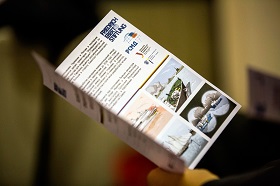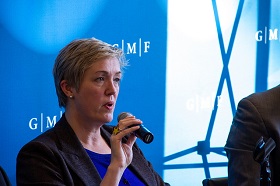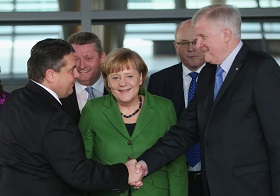New power means new responsibility
(no votes) |
(0 votes) |
Interview
Germany’s importance on the international scene has been steadily increasing as of late. The German Marshall Fund (GMF), together with the German Institute for International and Security Affairs (SWP) recently published the report “New Power, New Responsibility: Elements of a German Foreign and Security Policy for a Changing World”. We discussed this report and Germany’s new role with Dr. Constanze Stelzenmüller, Senior Transatlantic Fellow with the German Marshall Fund of the United States in Berlin.
Interview
Germany’s importance on the international scene has been steadily increasing as of late. The German Marshall Fund (GMF), together with the German Institute for International and Security Affairs (SWP) recently published the report “New Power, New Responsibility: Elements of a German Foreign and Security Policy for a Changing World”. We discussed this report and Germany’s new role with Dr. Constanze Stelzenmüller, Senior Transatlantic Fellow with the German Marshall Fund of the United States in Berlin.
Dr. Stelzenmüller, could you please tell us about the report “New Power, New Responsibility: Elements of a German Foreign and Security Policy for a Changing World”. Why did the German Marshall Fund (GMF) decide to publish it at this particular time? Who were its authors? What was the methodology of the research undertaken for this report?
The report “New Power, New Responsibility” is a project which GMF undertook jointly with Stiftung Wissenschaft und Politik (German Institute for International and Security Affairs), the largest government-funded think tank in Berlin, and with funding from the German Foreign Ministry. But GMF and SWP were only the coordinators; the report itself was written by four working groups, each made up of ten members. In total, about 50 people were involved.
The working groups included men and women from relevant ministries, five legislators from every party (including Die Linke—The Left—which is quite remarkable), and other experts from business, NGOs, media, and academia. The four working groups were titled “Germany and the International Order,” “Germany and Europe,” “Germany and its Strategic Partnerships,” and “Germany and International Security”. Each group was asked to draft a 2000-word paper, and then met between November 2012 and June 2013. Plenary sessions were held at the beginning, halfway through, and at the conclusions. In between the plenaries, the working groups met at SWP or GMF to discuss and draft their papers. GMF and SWP acted as facilitators at the meetings; between June and September, we edited the four chapters, and added an introductory chapter based on the plenary discussions about the key elements and challenges of Germany’s new strategic situation.
I think it’s a good report. But the process was at least as important as the outcome, because it brought together members of the executive branch, the legislative branch and civil society to discuss these issues in depth and in a way that had not been done before. They educated each other about their world views, about their priorities and about their constraints. I think that that was very useful for all sides.
The process took place in parallel with the 2013 national election. We all agreed that we would not publish the report during the election campaign, because we did not want to politicize the discussions; that would have been presumptuous. Our goal was to make the report available just in time for the start of the coalition negotiations. We wanted the report, which was published on October 16, to be seen as a benchmark: “This is what we think a forward-leaning, internationalist, and activist German foreign policy should look like.” And we hoped, of course, that some of that would filter into the coalition negotiations.
How would you describe the new role of Germany in Europe and the world?
The title of the report, “New Power, New Responsibility”, describes it in a nutshell. Our neighbors, our friends, our allies and our strategic partners all seem to agree that Germany has more power than it used to, because it has been amazingly successful economically during the global financial crisis when other countries in Europe were suffering greatly. And of course there is a large discussion among our neighbors and allies about what Germany should do with this power. We felt Germany needed to respond to these expectations.
So what the report says is that Germany’s new power means that it needs to take on more responsibilities. Our key analytical insight was that Germany is a hyper-globalized country. It has profited immensely from the international movement of people, goods, ideas and data. These have given it not just wealth, prosperity and stability, but also a tremendous amount of influence in the world.
At the same time, this interdependence makes Germany incredibly vulnerable. Indeed, much of its power is dependent on the success of its exports. Germany exports to the Eurozone, China, and the United States (Russia ranks in tenth place on the list of Germany’s bilateral trading partners). So if anything bad happens in its trade with the Eurozone, China, or the United States, that would be very bad for Germany—for its economy as well as its power. So, the report argues that if there is one single existential strategic imperative for Germany, it is that Germany has to invest in protecting, preserving and adapting the free, collaborative and peaceful international order that protects globalization.
A related important point which the report makes in the introduction is that globalization also makes Germany dependent on collaboration with its neighbors, partners and allies. Today, there is almost no problem that can be solved by one country on its own. That means we need to invest in our relationships, and exercise leadership very carefully and thoughtfully.
Finally: power. The standard way of thinking about power is that there are two kinds: soft power (“butter”) or hard power (“guns”). The cliché has always been that Europe is Venus and has the butter, while America is Mars and has the guns. Today in Europe we do not have many guns, but we also have less butter than we used to. So—the report argues—we have to think about power in a new way, since we live in a world that has become very complicated, incoherent and difficult to predict. Our working groups concluded that the real meaning of power today is the ability to solve problems that affect us all—and not just for our own benefit and profit, but for the profit and benefit of all. That, too, means working very closely with partners. And it requires consideration of the interests of others, as well as the ability to compromise.
Is Russia likely to become an important part of the new German foreign policy? How will the new German coalition government likely to affect Russia-Germany relations?
The relationship with Russia has always been an important part of German foreign policy. The coalition agreement between the Christian Democratic Party and the Social Democratic Party contains a long passage about Russia. Moreover, the new German foreign minister—the Social-Democrat Frank-Walter Steinmeier—has said good relations with Russia are important. We do cooperate on key issues, such as Afghanistan and Iran, and that is important. On the other hand, German-Russian official relations these days are not particularly good. In fact, there are disagreements between Russia and Europe on a number of important issues. I don’t have the impression that these disagreements are going to be resolved soon.
A key controversial issue between Germany and Russia is the fate of Europe’s Eastern periphery, of the EU’s Eastern Partnership nations, from Belarus and Ukraine to Moldova, Georgia, Azerbaijan, and Armenia. To the extent that Russia asserts a right to have its own sphere of influence in Europe’s Eastern neighborhood, while the European Union and Germany are saying that they do not accept that concept, I suppose we have to talk about systemic competition. But the German government’s position is that nations should be able to choose their own way, and if they want to go westwards, it wants to be able to help them. This issue is going to remain an important source of disagreement—as Steinmeier’s recent visit to Moscow showed.
Personally, I think that stability, prosperity and democratic transformation in the Eastern neighborhood of Europe would benefit Russia as well. The “New Power, New Responsibility” report points out the strategic importance of Europe’s Southern and Eastern neighborhoods to the European Union—and adds that the EU and Germany have a strategic interest in the stability of these regions. It also says that prosperity, stability and democratic transformation are not contradictions; they ultimately go together.
An entire chapter in our report is dedicated to making the argument that for the international order to remain free, open, and collaborative, it needs to be adapted along with the new rising powers. For example, the report calls for the adaptation of voting rights in international institutions to reflect the new role of rising powers. But there are also non-negotiable points: for example, the universality of human rights, or the sovereign right of nations to choose their own alliances.
That said, where Russia is concerned, there is one key difference between Europe and Germany on the one hand and the United States on the other. The Americans can afford to engage with Russia selectively and from a long distance on the issues they choose, such as Afghanistan, Iran, and Syria. Germany and Europe do not have the luxury of selective engagement, precisely because we share the same continent. Therefore, what happens in Russia and where Russia’s future lies is a strategic concern for us. Our future is much more interdependent. That has consequences for our foreign policy.
What could be the benefits and disadvantages to Germany from Ukraine, Moldova and Georgia signing association treaties with the European Union?
The view from Berlin is that the more able, prosperous, well-administered, and well-governed the Eastern periphery is, the better off and the safer Europe is. If our neighborhood is unsafe, unstable, and poor, we end up with inflows of what is often called “the dark side of globalization” from the East: illegal immigration, arms smuggling, drug smuggling, sex trafficking, and cyber crime. We are getting some of that already. At the same time, we see not just rich people and capital moving westwards, but a lot of middle class Russians. It seems pretty clear that this is a reaction to the doubts that Russians have about their future in Russia.

Experts Present Four Scenarios for
Russia-Germany Relations
For Germany, the point of the EU association treaties with the countries of the Eastern Partnership is not Europe’s Eastern neighborhood becoming—as some Russian commentators have suspected—part of a “European empire,” or its being removed from Russian influence. Nor is this about territorial domination or control. Very simply, the trade association agreements provide for greater prosperity and stability. I would like to see a prosperous, safe, and hopefully democratic Ukraine, Moldova and Georgia. I acknowledge that they have many problems now, but I think that it would be very beneficial for Russia too if these countries became better governed and more stable.
How does Germany regard the role of OSCE? How does it see the future of this organization?
The OSCE had a very important role during the Cold War, as it was the cradle of the Helsinki accords and their famous third basket which marked the beginning of the end of the Cold War and the Warsaw pact. Today, the OSCE is the only transcontinental security organization that includes Russia. That has had an undeniable value.
The question Europeans and Germans are asking, though, is what Russia wants the OSCE for. For a while, it seemed that Russian governments thought of the OSCE as an alternative NATO or even as a replacement for NATO. And some left-of-center European political movements supported this idea. I think this illusion is now over. Despite the problems that NATO has, NATO will remain a forum for strategic consultations between Europe and the US—and also with Russia.
The OSCE remains an important framework for conversations about arms control in Europe and Eurasia, of course: for nuclear disarmament, as well as for the liquidation of outdated nuclear, chemical, and bacteriological materials.
But what we—as Europeans, Americans, and Russians—really need is a functioning framework for discussions on common global concerns; and not just the fundamental questions of war and peace (e.g. Syria) which are discussed at the United Nations Security Council, or the regional issues discussed at the NATO-Russia Council. I think everyone hopes that it is possible to find such formats.
Most likely we will be looking at frameworks for these conversations that are much more informal and much more consultative and ad hoc.
Interviewer: Nikolay Markotkin, RIAC Program Coordinator
(no votes) |
(0 votes) |





